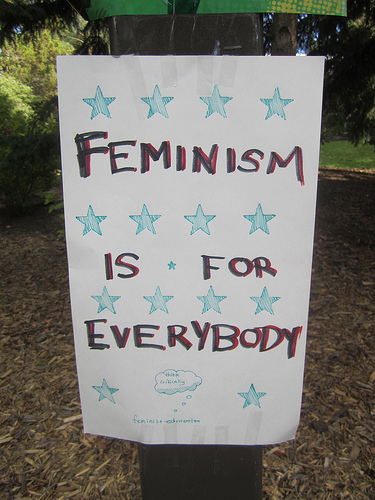First Lady Michelle Obama has been taking a lot of heat in the media recently. Whether picking apart her work decisions (it’s not like she has a lot to do at home, right?) or incessantly analyzing her bitch face (at a FUNERAL. News flash: people don’t usually look joyous when mourning a great leader’s death), the coverage has been harsh. All of this has ignited a great debate about feminism, and the dialogue has not been inclusive to feminist women of colour.
If you’d like some background on the topic, check out the piece called “Women of Color and Feminism: A History Lesson and Way Forward” by Anthea Butler. It’s a great recap of the historical struggles that black women face in accessing the mainstream “feminist” dialogue. So what are some of these systemic barriers? One of the most important things to realize is the fact that “women of color have never had the luxury of simply focusing on women’s issues,” as Butler notes.
This is true. To read more about that aspect of the black feminist’s journey, read what Mikki Kendall had to say in her article, “For Black Women, Everything is Feminist Issue.” These pieces form RH Reality Check emphasize one key point. White feminists need to be aware of how their privilege affects their struggle (or lack of one). Kendall writes, “as we speak of what harms feminism, of what nightmares invade the feminist subconscious, we must remember that we are not all fighting the same forms of sexism.”
Butler describes the way forward as a place where feminists come together and address common and unique struggles of minority groups. In particular, “white feminists must come to grips with their own internalized structures of racism, classism, and even sexism that prevent them from seeing other feminists of color.”
To do this, white feminists must first acknowledge and address their privilege. Rabble has a great 3 Minute Action on calling people out that can help you push white feminists out of their own bubble.
The Deeply Problematic: Feminism, and Stuff blog has a great post on being a support to marginalized groups. There is a great breakdown of Dos and Don’ts for being a good ally. For instance, an important tip: don’t speak for the marginalized person. “
For even more information, check out these tips from Regina Mahone. She acknowledges important boundaries that white feminists must accept, like the fact that less privileged feminists can’t afford to “lean in” – they need to lean on others for support! Many of these tips on being an ally also identify that you must admit when you are wrong. We all have trouble saying sorry when called out, but remember not to argue your privilege. As the allyship blog post indicates, someone calling you out on your privilege isn’t just doing it for fun. If they mention it, you probably did something wrong. Own up to it.
As the feminist movement develops and grows, we all need to come together to support one another and advance the cause. The first step to truly bring feminist minority women into the fold is to recognize the privilege of feminists in the majority, and work towards being a good ally.



